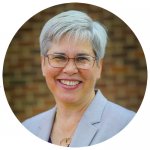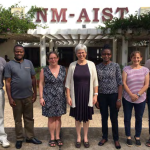The Bulletin | Spring/Summer 2024
The Spring/Summer 2024 issue of The Bulletin will arrive in mailboxes in mid to late June. Look for yours soon!
 ABOUT THE COVER
ABOUT THE COVER
Photo by Kayla Beasley and digital illustration by Hannah Gerig Meyer ’08
Blanding’s turtles are state endangered. Recently, they have been discovered at Merry Lea Environmental Learning Center of Goshen College and are now being counted, tracked and researched by faculty and students. This is just one of the examples of the beneficial, rich and varied kinds of research that GC students, professors and alumni are doing across the disciplines.
FROM THE PRESIDENT
A truth-seeking community
By Rebecca J. Stoltzfus ’83, president
“One of the beautiful aspects about a liberal arts college is the multitude of questions being asked by our students and faculty, as well as the variety of approaches used to pursue them. A liberal arts education affirms the breadth of our curiosity and liberates us from fear of our questions and the answers we might find.”
FEATURES
Hands-on research that serves
Goshen College President Rebecca Stoltzfus ’83 leads a diverse, international research team in Tanzania to study maternal and child health, focusing on aflatoxin’s impact on infant growth with support from the Bill & Melinda Gates Foundation.
 Environmental economics research in practice: Carbon onsetting
Environmental economics research in practice: Carbon onsetting
Since 2007, economics professor Jerrell Ross Richer ’85 has revitalized the global economics minor at GC by emphasizing climate change and sustainability through courses that adhere to principles of being planet-friendly, people-friendly and profitable.
 Research as storytelling: Goshen Spotlight Documentaries
Research as storytelling: Goshen Spotlight Documentaries
At GC, research transcends data to uncover histories and amplify community narratives through video storytelling, led by associate professor of communication Kyle Hufford since 2013.
 Finding Becky: Endangered turtle research at Merry Lea
Finding Becky: Endangered turtle research at Merry Lea
Merry Lea serves as a hub for ecological research, a vision realized through projects such as the study of the endangered Blanding’s turtle, which has enhanced students’ research skills and understanding of environmental stewardship.
 Robert Brenneman: Peacemaking research in Central America
Robert Brenneman: Peacemaking research in Central America
Professor Robert Brenneman, director of criminal justice and restorative justice at GC, researches the root causes of violence in northern Central America, exploring themes such as gang affiliation and Evangelicalism in his work.
 Jan Bender Shetler: Tanzanian cultural heritage research and preservation
Jan Bender Shetler: Tanzanian cultural heritage research and preservation
Jan Bender Shetler ’78, director of international education and former professor of history at GC, is set to retire this year after a distinguished career focused on historical research and cultural preservation, notably creating the Mara Cultural Heritage Digital Library in Tanzania.
 Duane Stoltzfus: Research of conscientious objectors
Duane Stoltzfus: Research of conscientious objectors
With 14 words, the U.S. Bureau of Naturalization recast the terms of citizenship in the United States after World War I, in effect declaring pacifists the new enemy, according to Duane Stoltzfus ’81, professor of communication and director of adult and graduate programs at GC.
 Meet some of our recent Maple Scholars alumni
Meet some of our recent Maple Scholars alumni
Goshen College was a pioneer in undergraduate research with the launch of the Maple Scholars program in 1998. Meet a few of our recent Maple Scholars alumni and find out what they are doing now.

Mary K. Oyer ’45, professor emerita of music, died on January 11, 2024, at the age of 100. Read the edited remarks President Stoltzfus shared at Mary’s memorial service on March 10, reflecting on Oyer’s impactful career at Goshen College from 1945 to 1987.
LASTING TIES

Microbiology for everyone
By Joe Springer ’80, curator, Mennonite Historical Library
On December 18, 1978, Jonathan N. Roth ’59 applied for a U.S. patent for “pectin culture media and method” to provide a simpler, cost-effective alternative to agar for growing microorganism cultures. Partnering with Mel Kosnoff to market the product, Roth, who taught at the college from 1962 to 2004, invented several tools for microbiology, held around 20 patents and was known for his high teaching standards.





